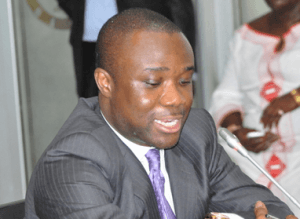Cabinet approves Ghana’s accession to Budapest Convention

The Cabinet has approved Ghana’s accession to the Budapest Convention on cyber-crime, Mr Felix Ofosu Kwakye, a Deputy Minister of Communication has announced.
The Convention pursues as a matter of priority a common criminal policy aimed at protecting countries against cyber-crime by adopting appropriate legislation and fostering international cooperation.
Speaking in Accra at the opening of the 2016 National Cyber Security Week, Mr Ofosu Kwakye said to tackle the cyber menace, the Ministry in collaboration with the International Telecommunications Union (ITU) established the National Computer Emergency response team (CERT-GH) to coordinate handling and sharing of cyber intelligence with all network operators in the country.
He said Cabinet had also approved for implementation the National Cyber Security Policy and Strategy to further empower CERT-GH to continue the fight against cyber-crime.
It has, also adopted Ghana’s framework for Child Online Protection (COP) and the appointment of a Cyber Security Advisor.
The Cyber Security Conference is one of the major activities for the National Cyber Security Week Celebration being held on the theme: “Unifying Our Efforts to Secure Our Cyberspace.”
He said the ITU implemented a number of programmes and initiatives to help countries adopt appropriate measures aimed at protecting the cyberspace.
“The ITU’s recent Global Cyber security Index and Cyber Wellness Profile ranking, placed Ghana 19th with an index of 0.294 giving an indication of where Ghana stands globally in terms of her preparedness and commitments towards securing its national cyberspace,” he stated.
“Ghana have been able to reach this status due to several Cyber security initiatives that has been implemented through the collaborative efforts of its international partners who have shown great enthusiasm in assisting Ghana secure its territorial cyberspace,” he added.
Mr Ofosu Kwakye said to ensure successful prosecutions of cross-border ICT crimes, it was beneficial to be part of global arrangement that would strengthen the nation’s capacity and reach.
“A national cyber security centre envisaged in the Policy and Strategy will become the central point of coordination and enforcement of standards as we continue to fight against cybercrime,” he said.
“I would like to take the opportunity to entreat the private sector to work with Government to educate the public and share cyber intelligence for the collective good of Ghana,” the Deputy Minister added.
Mr Ofosu Kwakye said: “Cyberspace is real and so are the risks that come with it. The very technologies that empower us to create and to build also empower criminals to disrupt and destroy. It is only by working together that we can make meaningful progress and fight this menace.”
He extended government’s appreciation of assistance received from the international community in cyber security training and collaboration.
“Collectively, we can protect our cyber space to benefit from the massive infrastructure investment that Government has provided to promote education, health delivery, business development, environmental monitoring, good government and employment generation,” he said.
Mr Robert P. Jackson, the United States Ambassador, applauded the approval, just last week, of Ghana’s National Cyber security Policy and Strategy.
“This will be a living document that Ghana can continue to build upon and improve as technology and conditions change,” he said.
He said attacking the threat of cyber-criminal activity requires a whole-of-government and multi-stakeholder approach; adding that “no single government, and no single organisation, has all of the resources and expertise to combat the advanced and persistent cyber-attacks that are being launched today”.
He said a vibrant partnership between government and the public and private sectors is essential to an effective cyber security policy.
Mr William Tevie, the Director General, National Communication Authority said this year, Ghana received a delegation from the Council of Europe to support Ghana ascend to the Budapest Convention.
He said Ghana was signing on to the GLACY+ capacity building programme for cybercrime and cyber security to help ascend to the convention.
“We are very grateful for the council of Europe for giving us an offer to ascend to the Budapest Convention,” he stated.
Professor Nii Narko Quaynor, the Chairman of the Board of the National Communication Authority (NITA) said: “We have to do justice and ensure a cyber space is a safe place to be.”
“Our values of human rights, freedoms, openness and privacy are powerful enough for us to want to work together towards safety and norms governing the use of the internet.”
He said the freedom that one internet brings surpasses fragmented internet and this ought to be preserved for the yet to be connected millions.
“Hence, it is not only the usual interested parties, stakeholders, government policy authority, law enforcement, judiciary, private sector, civil society, academic and technical communities who are to intensify their engagement.
“We must also appeal to the moral fabric of Ghanaian society and deepen our resolve for a safer cyber space.
“This effort would necessarily appeal to parents, religious leaders, traditional authorities, chiefs and larger community, to become engaged, to care about how we behave in cyber space,” he said.
Source: GNA
